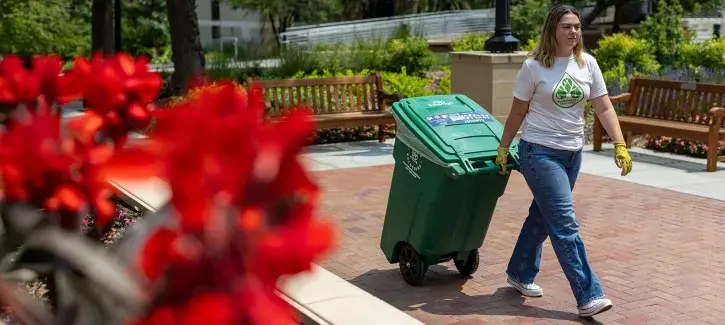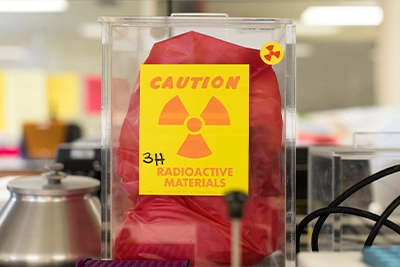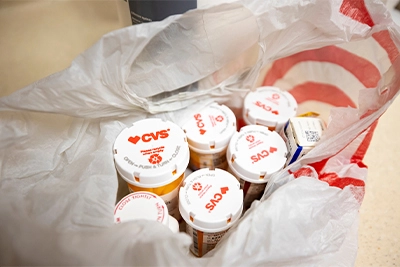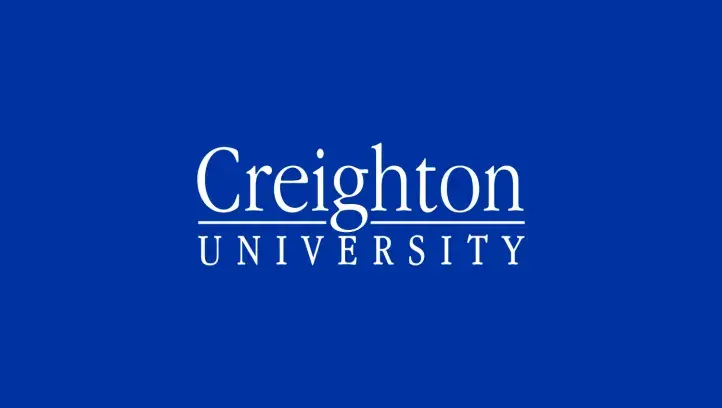
Beyond paper, plastic: Sustainable materials management

Recycling—converting waste into reusable materials—remains one of the simplest ways to care for our planet. As a single-stream recycling campus, Creighton provides blue bins across its locations for items like aluminum, paper and cardboard, making basic recycling convenient.
However, many everyday items like batteries, electronics, plastic bags, medical tools and furniture, require more than just a bin. These materials demand a systemic, lifecycle-based approach known as sustainable materials management.
“Mindful sorting of materials is essential for effective recycling,” says April Thompson, sustainability project and reporting coordinator for the Office of Sustainability Programs. “When we take the time to sort our waste correctly, we help prevent hazards and ensure the safety of those handling it. By being responsible recyclers, we not only care for our common home but also uphold cura personalis—respecting the well-being of all individuals involved in the process.
Here are just some of the ways in which Creighton is helping care for our common home through proper waste disposal and reduction:
Composting
Since 2020, Creighton’s Omaha campus has partnered with Hillside Solutions to collect post-consumer food waste—including meals, napkins and compostable flatware. Currently, nearly 500 pounds are composted weekly, totaling more than 25 tons this academic year—the equivalent of one full garbage truck diverted from landfills.
Composting, in particular, is a popular conservation option because compostable remnants include nutrients that can be absorbed by the soil, enhance plant growth and increase agricultural productivity. At Creighton, compost collection stations in the form of large green bins are located at Brandeis Dining Hall and along the pedestrian mall. Those living on campus can participate in the Residence Hall Composting Program, and the University’s catering partner, Sodexo, regularly uses compostable dinnerware at campus events throughout the year.

Chemical Waste and Biohazardous Materials
With more than 150 research and teaching labs, Creighton produces a significant amount of chemical and medical waste.
Mary Duda, Creighton’s laboratory and chemical compliance program manager, says last year 5,000 pounds of chemical waste was safely removed from labs and other spaces. Medical waste is more difficult to track, but the amount is still significant and impactful.
“We are required by law to properly dispose of these kinds of materials, and for good reason,” Duda says. “Otherwise, we risk chemicals winding up in rivers and lakes, used needles in dumpsters, or any other number of dangerous consequences.”
Electronics Recycling
Recycling at Creighton also includes the technology we use every day. From desktops and monitors to phones and ethernet cords, Creighton’s Division of Information Technology requires offices to recycle electronics.
With global e-waste projected to reach 82 million tons by 2030, proper recycling prevents toxic elements like lead, mercury and cadmium from harming the environment.
“Properly recycling e-waste is incredibly important,” says Don Hoffman, Creighton’s technology lifecycle manager. “Not only does it keep items out of the landfill, but it has many other benefits such as reducing our need for new raw materials, conserves energy and creates jobs.”
Creighton offices can use the Electronics Recycling form to request electronic recycling pickup. In Phoenix, offices are asked to contact facilities management.
Styrofoam
EPS, or expanded polystyrene, commonly known as styrofoam has long been a popular product used in everything from shipping containers to fast-food meals. However, it is also incredibly dangerous to the environment because of its lack of biodegradability.
With so many packages being delivered to Creighton daily, it can seem overwhelming to know what to do with the excess packaging materials. However, styrofoam can, in fact, be recycled when collected at a mass scale and Creighton has been intentional in its commitment to reducing EPS waste.
Last year, the University hosted a styrofoam recycling event over the Earth Day weekend, collecting 37.5 pounds. Year-round, anyone needing to properly dispose of their EPS waste can do so by dropping it off at the Criss Building. Creighton has collected more than 318 pounds of styrofoam since the program began in 2023.
Everything Else
Here are a few more items to consider that can either be recycled or should be thoughtfully disposed of:
Batteries: Alkaline batteries are not recyclable, but rechargeable batteries are. In Omaha, Creighton’s Division of Information Technology can recycle these for any faculty, staff or student who uses them. In Phoenix, recycling drop boxes are available in Suite 107 and Suite 211 (the student kitchenette).
Glass: While Creighton does not have the capacity to recycle glass, the University’s Omaha campus is located within a short walk from Omaha’s Northeast drop-off site on 17th and Burt streets (the site will be moving to 28th and Burt Streets in May). Glass can be recycled there daily. In Phoenix, the closest disposal unit is located at Encanto Park just southwest of campus and the Barrow Neurological Institute.

Prescription Drugs: Unused prescription drugs can be incredibly dangerous to the environment and people if not disposed of properly. CHI Health Pharmacies, including the Creighton University Campus Pharmacy at 24th and Cuming streets inside CHI Health Creighton University Medical Center – University Campus, will take any unused medications for proper disposal.
Refrigerators and Freezers: Refrigerators, freezers and any other items containing freon or other refrigerants must be disposed of through Facilities Management at Creighton. To start the process, complete this service request form.
Aerosol Cans: Aerosol cans are used widely for a variety of purposes including spray paints, hair spray, deodorants, air fresheners and more. With many featuring ozone-harming CFCs and VOCs, even empty cans can be highly flammable and toxic. These items can be recycled safely through Creighton’s laboratory and chemical compliance unit.
CFL and LED lighting: Lightbulbs, other than incandescent, pose hazards to the environment but are used widely. CFLs contain mercury and, while generally safer for the environment, LEDs can still contain heavy metals. Both types of light bulbs should be recycled properly, which can be done through the laboratory and chemical compliance unit.




